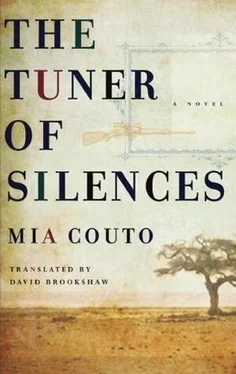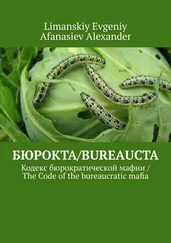— Aren’t you scared we’ll get caught, Ntunzi?
— You should be scared of not knowing anything. After reading, I’m going to teach you how to write.
It wasn’t long before we began clandestine writing lessons. Scribbling in the sand of the yard with a little piece of kindling wood, I was fascinated, and felt the world being reborn, like the savannah after the rains. I gradually came to understand Silvestre’s prohibitions: writing was a bridge between past and future times, times that had never existed in me.
— Is this my name?
— Yes. M-w-a-n-i-t-o, that’s what’s written. Can’t you read it?
I never told Ntunzi, but at the time, I had the impression that I wasn’t learning with him. My real teacher was Dordalma. The more I deciphered the words, the more my mother, in my dreams, gained physical and vocal expression. The river made me see the other side of the world. Writing returned my mother’s lost face to me.
On Aproximado’s next visit, Ntunzi stole the pencil he used to note down our orders for provisions. My brother solemnly twirled the pencil with the tips of his fingers and told me:
— Hide it well. This is your weapon.
— So where shall I write? Do I write on the ground? — I asked, in a whisper.
Ntunzi replied that he’d already given the matter some thought. And he walked off. Not long after, he reappeared with a pack of cards.
— This will be your school notebook. If the old man appears, we’ll pretend we’re having a game.
— Write on a pack of cards?
— What other paper is there round here?
— But with the pack we use to play?
— Precisely for that reason: Father will never suspect. We already cheat at cards. Now, we’ll cheat at life.
So that’s how I began my first diary. It was also how aces, jacks, queens, kings, deuces and the seven of hearts began to share my secrets. My minute scrawl filled hearts, clubs, diamonds and spades. Into those fifty-two little squares of paper, I poured a childhood of vexations, hopes and confessions. In my games with Ntunzi, I was always the loser. But I lost myself in my games with writing.
Every night, after my jottings, I would wrap the pack of cards up and bury it in the back yard. I would return to my room and gaze enviously at Ntunzi’s face as he slept. I had already learnt to glimpse the liquid lights of the river, and I already knew how to travel across written letters as if each one were an endless highway. But I still needed to know how to dream and to remember: I wanted that boat that took Ntunzi to the arms of our dead mother. On one occasion, my anger overflowed:
— Father says it’s a lie, he says you don’t dream about our mother.
Ntunzi looked at me with pity, as if I were disabled and that my organ for dreaming had been damaged.
— Do you want to dream? You’re going to have to pray, little brother.
— Pray? Don’t you know that Father. .
— Forget Father. And I said it’s if you want to dream.
— But I’ve never prayed. I don’t even know how it’s done. .
— Give me one of the cards, and I’ll write a prayer on it for you to learn by heart. Then, you’ll start dreaming, just you see.
I dug up the pack and handed him an ace of diamonds. He would have space enough around the red lozenge to scribble the sacred words.
— No, not that one. You’d better give me a queen. It’s because it’s a prayer to Our Lady.
I guarded that card as if it were the most precious thing I would ever possess in my life. When I knelt down by my bed, my heart would stumble over that little prayer. Until, one day, the soldier Zachary surprised me as I was mouthing the litany.
— Are you singing, Mwanito?
— No, Zaca, it’s nothing. It’s Russian. I learnt the labels that were left.
I didn’t have a leg to stand on with my lie. Zachary, of course, was spying on us under orders from Silvestre. We were immediately summoned before him. My father already had his charges prepared against Ntunzi:
— It was you who taught your little brother.
Foreseeing violence, I rushed forward to defend my brother:
— I learnt it without Ntunzi knowing.
— No one prays here!
— But Father, what’s so bad about it? — Ntunzi asked.
— To pray is to summon visitors.
— But what visitors, if there’s no one else in the world?
— There’s Uncle. . — I improvised a correction.
— Shut up, who told you to talk? — my brother shouted.
Old Silvestre smiled, pleased at his elder son’s desperate behaviour. He didn’t have to intervene, his son was receiving his punishment in another way. Ntunzi noted his father’s satisfaction and took a deep breath in order to control himself. His tone was more measured by the time he spoke again:
— What visitors from outside could we have? Explain it to us, Father.
— There are visitors we can have without even being aware of it. They’re angels and demons who turn up without so much as a by your leave. .
— Angels or demons?
— Angels or demons, there’s no difference between them. The difference lies in us.
Silvestre’s raised arm left no room for doubt: the conversation had exceeded its limits. It was made clear that there was to be no more praying, ever. And that was it, period, there was only one resolution and that was irrefutable.
— And you! — my father proclaimed, pointing at me: — I don’t want to hear you crying ever again.
— When did I ever cry, Father?
— Just now, you were snivelling.
And just as he was leaving, Ntunzi showed that he wanted to have the last word. Before Silvestre’s astonished gaze, he asked:
— No praying or crying?
— Crying or praying, it’s all the same thing.

The following night, I was woken by the roar of lions. They were nearby, maybe they were even prowling round the corral. In the darkness of the room, I hugged myself to try and get to sleep. Ntunzi was dead to the world while I was unable to curb my fear, and went to find shelter under my father’s bed. In that clandestine intimacy, flat out on the cold floor, I was lulled to sleep by his snores. But not long afterwards, I was discovered and expelled angrily.
— Father, please, let me sleep with you just this once.
— People sleep together in the cemetery.
I returned to my bed, unprotected, and listened to the roars of the big cats, which came ever nearer. At that moment, as I stumbled around defenceless in the dark, I hated my father for the first time. As I settled down in bed, my heart was seething with fury.
— Shall we kill him?
Ntunzi was leaning on his elbow in bed, waiting for my answer. He waited in vain. My voice had stuck in my throat. He pressed on:
— The bastard killed our mother.
I shook my head, desperately refuting the idea. I didn’t want to listen. I wished I could hear the lions roaring again so that they might block out my brother’s voice.
— Don’t you believe it?
— No — I murmured.
— Don’t you trust me?
— Maybe.
— Maybe?
That “maybe” was an added burden on my conscience. How could I admit the possibility that my father might be a murderer? For a long time I tried to assuage this guilt. And I mulled over possible underlying reasons: if something had happened, my father must have acted against his will. Who knows, perhaps he had done so in illegitimate defence? Or maybe he had killed out of love and, in carrying out the crime, half of him had died as well?
Читать дальше













